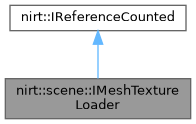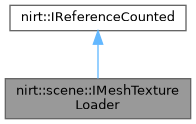 |
Nirtcpp 2.1.0
Nirtcpp is a high-performance c++ graphics engine.
|
 |
Nirtcpp 2.1.0
Nirtcpp is a high-performance c++ graphics engine.
|
Finding and loading textures inside meshloaders. More...
#include <nirtcpp/core/engine/IMeshTextureLoader.hpp>


Public Member Functions | |
| virtual | ~IMeshTextureLoader () |
| Destructor. | |
| virtual void | setTexturePath (const nirt::io::path &path)=0 |
| Set a custom texture path. | |
| virtual const nirt::io::path & | getTexturePath () const =0 |
| Get the current custom texture path. | |
| virtual nirt::video::ITexture * | getTexture (const nirt::io::path &textureName)=0 |
| Get the texture by searching for it in all paths that makes sense for the given textureName. | |
| virtual void | setMeshFile (const nirt::io::IReadFile *meshFile)=0 |
| Meshloaders will search paths relative to the meshFile. | |
| virtual void | setMaterialFile (const nirt::io::IReadFile *materialFile)=0 |
| Meshloaders will try to look relative to the path of the materialFile. | |
 Public Member Functions inherited from nirt::IReferenceCounted Public Member Functions inherited from nirt::IReferenceCounted | |
| IReferenceCounted () | |
| Constructor. | |
| virtual | ~IReferenceCounted () |
| Destructor. | |
| void | grab () const |
| Grabs the object. Increments the reference counter by one. | |
| bool | drop () const |
| Drops the object. Decrements the reference counter by one. | |
| s32 | getReferenceCount () const |
| Get the reference count. | |
| const c8 * | getDebugName () const |
| Returns the debug name of the object. | |
Additional Inherited Members | |
 Protected Member Functions inherited from nirt::IReferenceCounted Protected Member Functions inherited from nirt::IReferenceCounted | |
| void | setDebugName (const c8 *newName) |
| Sets the debug name of the object. | |
Finding and loading textures inside meshloaders.
A texture loader can search for a texture in several paths. For example relative to a given texture-path, relative to the current working directory or relative to a mesh- and/or material-file.
|
pure virtual |
Get the texture by searching for it in all paths that makes sense for the given textureName.
Usually you do not have to use this method, it is used internally by IMeshLoader's.
| textureName | Texturename as used in the mesh-format |
|
pure virtual |
Meshloaders will try to look relative to the path of the materialFile.
Usually you do not have to use this method, it is used internally by IMeshLoader's. Any values you set here will likely be overwritten internally.
|
pure virtual |
Meshloaders will search paths relative to the meshFile.
Usually you do not have to use this method, it is used internally by IMeshLoader's. Any values you set here will likely be overwritten internally.
|
pure virtual |
Set a custom texture path.
This is the first path the texture-loader should search.